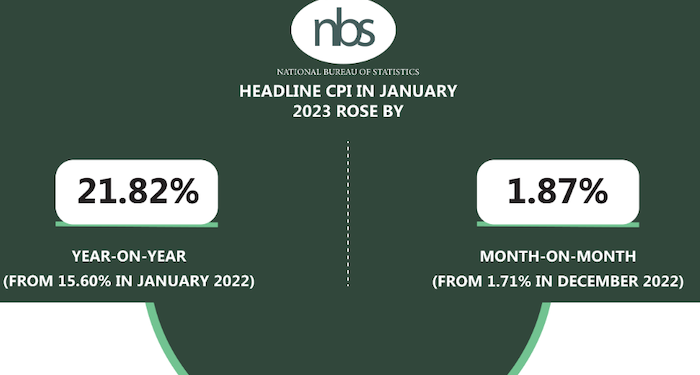In February 2023, the consumer price index (CPI), which measures the rate of change in prices of goods and services, increased from 21.82 percent to 21.91 percent.
Wednesday’s release of the most recent CPI report by the National Bureau of Statistics contains the inflation rate data (NBS).
The February hike is the second straight rise in the country’s inflation rate this year, as Nigerians struggle to access currency for their everyday necessities due to the Central Bank of Nigeria’s naira devaluation strategy (CBN).
According to the NBS report, the headline inflation rate for February 2023 was 0.09 percentage points higher than the headline inflation rate for January 2023.
“Similarly, on an annualized basis, the headline inflation rate was 6.21 percentage points higher than the rate recorded in February 2022, which was 15.70 percent,” the bureau reported.
“This demonstrates that the headline inflation rate (year-over-year) increased in February 2023 compared to the same month the year before” (i.e., February 2022).
The month-to-month percentage change in the all-items index was 1.71 percent in February 2023, 0.16 percentage points lower than the rate recorded in January 2023 (1.87 percent).
This indicates that the average price level in February 2023 was 0.16 percent lower than in January 2023.
NBS also highlighted that the percentage rise in the average CPI for the 12-month period ending in February 2023 relative to the average CPI for the preceding 12-month period was 19.87 percent, representing a 3.15 percentage point increase from the 16.73 percent recorded in February 2022.
According to the statistics, the annual food inflation rate in February 2023 was 24.35 percent, a 7.24 percentage point rise over the 17.11 percent rate reported in February 2022.
According to the statistics organization, the increase in food inflation was a result of price rises for oil and fat, bread and cereals, potatoes, yam and other tubers, fish, fruits, meat, vegetables, and food products.
Kwara, Imo, and Lagos people paid more for food during the period under consideration, according to a state profile.
The study states, “Month-over-month, the food inflation rate in February 2023 was 1.90 percent, a drop of 0.18 percentage points from the rate reported in January 2023 (2.08 percent).”
“The average annual rate of food inflation for the twelve months ending in February 2023 was 22.12 percent, which was 2.44 percentage points more than the average annual rate of change recorded in February 2022.” (19.69 percent).
In February 2023, food inflation was highest in Kwara (29.51 percent), Imo (27.47 percent), and Lagos (27.42 percent), while it was lowest in Sokoto (18.54 percent), Jigawa (19.67 percent), and Yobe (21.89 percent).
Yobe (3.15 percent), Edo (3.03 percent), and Ogun (2.90 percent) had the highest month-over-month food inflation in February 2023, while Rivers (0.75 percent), Sokoto (0.89 percent), and Nasarawa (0.90 percent) had the lowest.


